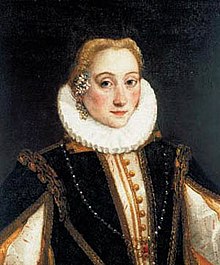Олимпия Фульвия Мората
Олимпия Фульвия Мората | |
|---|---|
 | |
| Рожденный | 1526 |
| Умер | 26 октября 1555 г. |
Олимпия Фульвия Мората (1526 - 26 октября 1555 г.) была итальянским классическим ученым.
Биография
[ редактировать ]Она родилась в Ферраре в Фулвио Пеллегрино Морато и определенной Лукрезии Гози .
Ее отец, который был преподавателем молодых князей герцогского дома Эсте, был в тесном выражении с самыми изученными людьми из Италии, и дочь выросла в атмосфере классического обучения. В возрасте двенадцати она смогла свободно общаться на греческом и латинском . [ 1 ]
Примерно в это же время она была вызвана во дворец в качестве спутника и инструктора младшей, но одинаково одаренной Анны Д'Эсте , дочери Ренаты, герцогини Феррара . [ 1 ] Многие люди с литературной известностью или протестантскими наклонностями, такими как Джон Кальвин , Виттория Колонна и Клемент Маро, посетили двор герцогини. В подростках Олимпии лекции на работах Цицерона и Кальвина. [2]
In 1546, she left court to take care of her ailing father and, after his death, she took care of the education of her brothers and sisters. Olympia's father died a convert to Protestantism, and Olympia embraced the doctrines of Luther and Calvin. When she returned to court, Anna d'Este's marriage to Francis, Duke of Guise left Olympia isolated. She spent her time studying philosophy and corresponded with Gasparo Sardi, who dedicated his De Triplici Philosophia to her.[3]
About the end of 1550, she married a young student of medicine and philosophy, Andreas Grundler of Schweinfurt in Bavaria. In 1554 she accompanied Grundler to his place of birth, where he had been appointed physician to the garrison of Spanish troops. In 1553 the margrave Albert of Brandenburg on one of his plundering expeditions took possession of Schweinfurt, and was in turn besieged by the Protestants. At length Albert evacuated the place, and Olympia and her husband made their escape.[1] In the course of these events many of her writings were lost.
They finally succeeded in reaching Heidelberg in 1554 where a medical lectureship had been obtained for Grundler through the influence of the Erbach family, by whom they had been hospitably entertained during their flight.[1]
In 1558 (or 1556, sources differ), after her death, Opera omnia, a major collection of some of her Greek letters and Latin dialogues, was published in Basel,[4] a labour which she entrusted to her friend and correspondent Caelius Secundus Curio.[5][6]
References
[edit]- ^ Jump up to: a b c d Chisholm 1911.
- ^ Robin, Larsen and Levin. Encyclopedia of women in the Renaissance: Italy, France, and England. p. 269.
- ^ Robin, Larsen and Levin. Encyclopedia of women in the Renaissance: Italy, France, and England. p. 269.
- ^ Robin, Larsen and Levin. Encyclopedia of women in the Renaissance: Italy, France, and England. p. 215.
- ^ T. McCrie, History of the Progress and Suppression of the Reformation in Italy in the Sixteenth Century (William Blackwood, Edinburgh/T. Cadell, London 1827), pp. 400-02, and see Appendix, No. 7, pp. 425-26. M.L. King, Renaissance Humanism: An Anthology of Sources (Hackett Publishing, 2014), pp. 129-36.
- ^ McCarthy, Muriel; Sherwood-Smith, Caroline (1997). Eve Revived: An exhibition of early printed books relating to women in Marsh's Library. Dublin: Archbishop Marsh's Library. p. 49.
Sources
[edit]- Энн Р. Ларсен; Диана Робин; Кэрол Левин, ред. (2007). Энциклопедия женщин в Ренессансе: Италия, Франция и Англия . Abc-Clio, Inc.
- Эта статья включает в себя текст из публикации, который сейчас в общественном доступе : Чисхолм, Хью , изд. (1911). « Мората, Олимпия Фульвия ». Encyclopædia Britannica . Тол. 18 (11 -е изд.). Издательство Кембриджского университета. п. 816.